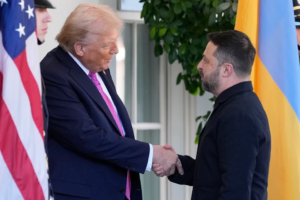In recent weeks, Republican members of Congress have found themselves at the center of heated town hall meetings, facing a wave of public anger directed at both former President Donald Trump and billionaire entrepreneur Elon Musk. These events, reminiscent of past political upheavals, highlight the deepening divide in American politics and the challenges lawmakers face in engaging with their constituents.
A Historical Parallel: Echoes of 2009 and 2017
The current wave of town hall confrontations draws striking parallels to previous moments of political unrest. In 2009, during the debate over the Affordable Care Act (Obamacare), and again in 2017, during the GOP’s push to repeal it, town halls became battlegrounds for passionate protests. Today, as Republicans grapple with public backlash over Musk’s controversial policies and Trump’s enduring influence, history seems to be repeating itself.
Ezra Levin, co-executive director of the progressive organization Indivisible, aptly noted, “They say history only rhymes and doesn’t just repeat, but goddamn, this feels like a repeat.” The comparison underscores the cyclical nature of political activism and the power of grassroots movements to shape public discourse.
Republican Strategies: Navigating the Storm
Faced with increasingly hostile town halls, Republican leaders are weighing their options. Some, like Rep. Rich McCormick (R-Ga.), have vowed to continue holding these events despite the challenges. McCormick, who recently faced a contentious town hall where voters shouted him down over Medicaid cuts and Musk’s policies, acknowledged the difficulties but emphasized the importance of dialogue.
“People aren’t there to listen. They’re not there for dialogue. They’re just there to argue,” McCormick told HuffPost. However, he remains committed to finding ways to make these interactions more productive, stating, “I think I could do several things which would optimize the usefulness of it.”
Other Republicans, however, are heeding the advice of strategists to avoid in-person town halls altogether. Instead, they are exploring alternatives like tele-town halls and virtual meetings on platforms like Facebook. These formats offer greater control over the conversation, allowing lawmakers to sidestep the chaos of live protests.
The Role of Liberal Activist Groups
Liberal organizations like Indivisible and MoveOn have long played a pivotal role in mobilizing opposition at Republican town halls. Their strategies include organizing protests, flooding events with passionate constituents, and using social media to amplify their message. These efforts have proven effective in drawing national attention to local issues and holding lawmakers accountable.
Indivisible is now taking its efforts a step further, instructing its members to call their representatives’ offices daily to uncover upcoming town hall schedules. The goal is to prevent Republicans from announcing “surprise” events at the last minute, ensuring that activists have time to organize and attend. If lawmakers refuse to hold town halls, Indivisible plans to host “empty chair” events, using props like cardboard cutouts or even live chickens to symbolize the absence of their elected officials.
The GOP’s Counter-Narrative: Downplaying the Protests
Republican leaders and their allies have sought to downplay the significance of the protests, framing them as orchestrated efforts by paid activists. House Speaker Mike Johnson (R-La.) claimed in a CNN interview that many of the town hall disruptions were staged by “paid protesters.” Similarly, Elon Musk took to social media to dismiss the outrage over his Department of Government Efficiency (DOGE) as “fake.”
These accusations echo past attempts to discredit grassroots movements. In 2009, then-Speaker Nancy Pelosi (D-Calif.) famously dismissed protests against Obamacare as “astroturf,” implying they were not genuine expressions of public sentiment. Such rhetoric, while politically expedient, risks further alienating voters who feel their concerns are being ignored.
The Broader Implications: A Test for Democracy

The ongoing town hall confrontations are more than just political theater—they are a litmus test for the health of American democracy. At their core, these events reflect the public’s demand for accountability and transparency from their elected officials. For Republicans, the challenge lies in balancing their legislative agenda with the need to engage meaningfully with their constituents.
As Rep. Doug LaMalfa (R-Calif.) observed, the current situation mirrors the unrest of 2017, when Trump’s election galvanized liberal activists. “It’s mirroring 2017 when Trump got elected; they came around, they sent busloads of people to various districts,” he said. This historical perspective underscores the cyclical nature of political activism and the enduring power of grassroots movements.
Looking Ahead: A Path Forward
For Republicans, the path forward is fraught with challenges. They must navigate the growing anti-Musk and anti-Trump sentiment while advancing their policy goals, such as extending and expanding the tax cuts from Trump’s first term. As one House Republican strategist noted, “We have a sale to make.” The key will be finding ways to communicate their message effectively, even in the face of widespread opposition.
Meanwhile, progressive groups like Indivisible are urging Democrats to hold their own town halls during upcoming congressional recesses. By creating a contrast with Republicans, they hope to capitalize on the current wave of activism and strengthen their position ahead of the next election cycle.
Why This Matters: A Call for Authentic Engagement
The town hall confrontations of 2025 serve as a reminder of the importance of authentic engagement in a functioning democracy. Whether through in-person meetings, virtual forums, or grassroots activism, the ability of citizens to voice their concerns and hold their leaders accountable is a cornerstone of democratic governance.
As the political landscape continues to evolve, one thing is clear: the voices of ordinary citizens will remain a powerful force in shaping the future of American politics.




